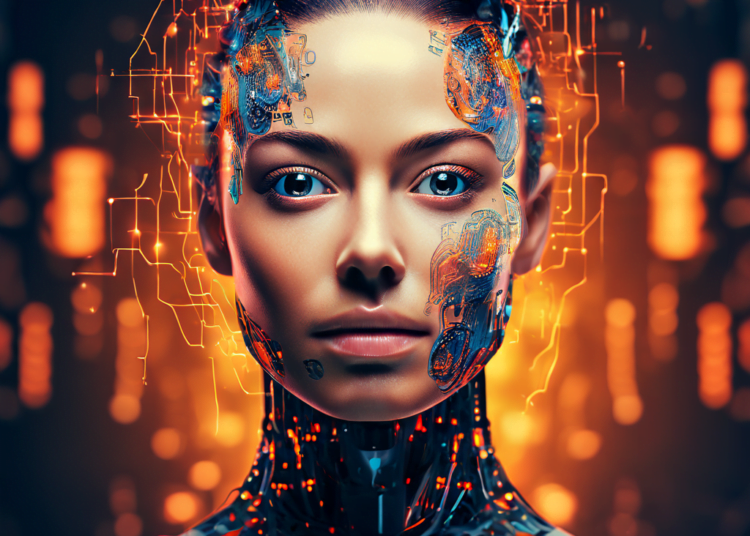Elon Musk, the visionary entrepreneur and CEO of SpaceX and Tesla, has made bold predictions about artificial intelligence (AI). According to Musk, AI is expected to surpass human intelligence shortly, bringing significant societal advancements and potential consequences.
Musk’s views on AI advancements have gained considerable attention and sparked debates among experts in the field. As a thought leader and advocate for responsible technology development, Musk has consistently emphasized the need for careful regulation and ethical considerations in the rapid evolution of AI.
In this article, we explore Elon Musk’s predictions about AI surpassing human intelligence and the implications of these advancements. From the future of AI technology to a comparative analysis of human and AI intelligence, we aim to provide you with a comprehensive understanding of the current landscape and potential future scenarios.
Key Takeaways:
- Elon Musk believes AI will soon surpass human intelligence.
- Regulation and ethical considerations are crucial for the responsible development of AI.
- The prospects of AI technology and the concept of technological singularity.
- A comparative analysis between human intelligence and AI intelligence.
- She was addressing the ethical challenges surrounding AI advancements.
Table of Contents
Elon Musk’s Views on AI Advancements
Elon Musk, a renowned entrepreneur and visionary, has been at the forefront of numerous technological advancements and is known for his thought-provoking views on the future of AI technology. Musk firmly believes that AI will surpass human intelligence, leading to profound changes in our society and everyday lives. He has been vocal about AI’s potential risks and benefits, emphasizing the need for careful regulation and responsible development.
Musk’s views on AI advancements stem from his deep concern about the rapid evolution of artificial intelligence. While acknowledging AI’s tremendous potential for solving complex problems and enhancing human capabilities, he also highlights the pressing need to ensure that AI is developed and deployed ethically. Musk believes that AI could pose significant risks to humanity without proper regulation.
“We need to be extremely careful with AI. It’s a fundamental risk to human civilization,” Musk stated during a conference on AI. “There needs to be some regulatory oversight, maybe at the national and international level, just to ensure we don’t do something very foolish.”
As part of his efforts to address the potential dangers of AI, Musk co-founded OpenAI, a non-profit research organization dedicated to ensuring that artificial general intelligence (AGI) benefits all of humanity. OpenAI aims to develop AI technologies that are safe, transparent, and aligned with human values.
Elon Musk’s views on AI advancements have sparked widespread debate and discussion within the scientific and technological communities. While some share their concerns about the potential risks of uncontrolled AI development, others argue that AI can benefit society responsibly.
The Future of AI Technology
Looking ahead, the future of AI technology appears both promising and challenging. With AI on the path to surpassing human intelligence, society must consider this technological singularity’s potential implications carefully. Industries ranging from healthcare to transportation to finance will likely undergo significant transformations as AI advances.
The rapid pace of AI advancements requires ongoing ethical considerations and regulatory measures. Elon Musk’s advocacy for responsible AI development reminds us that ethical guidelines must be in place to harness the full potential of AI technology while mitigating potential risks.
Advantages of AI Advancements | Risks and Challenges |
|
|
Key Considerations | Regulatory Approach Advertisement. Scroll to continue reading. |
|
|
As we navigate the future of AI technology, the discussions surrounding its advancements and responsible implementation will continue to shape society’s trajectory. Elon Musk’s insights and contributions to this field catalyze critical thinking and proactive measures to ensure that AI technology is utilized for the betterment of humanity.
The Future of AI Technology
As AI advancements continue to accelerate, the future of AI technology holds immense potential and unprecedented possibilities. One concept that researchers and experts are exploring is the idea of technological singularity, a point at which AI surpasses human intelligence. This paradigm shift in AI’s capabilities will impact various industries and society.
The trajectory of AI surpassing human intelligence raises intriguing questions about the future landscape of technology. With the rapid pace at which AI is evolving, technology predictions indicate that we may witness this milestone sooner than we anticipate. As AI becomes increasingly sophisticated, it has the potential to outperform humans in complex tasks, leading to advancements that could revolutionize fields such as healthcare, finance, transportation, and more.
The concept of technological singularity is not without its controversies and uncertainties. While some embrace the potential benefits of AI’s exceptional capabilities, others raise concerns about the implications of AI intelligence surpassing human intelligence. It prompts discussions around ethical considerations, responsible development, and regulation to ensure that AI technology is utilized to benefit humanity.
The future of AI technology also brings attention to the need for continuous adaptation and learning. As AI becomes increasingly autonomous and capable of self-improvement, researchers, developers, and policymakers must stay at the forefront of these advancements to shape regulations and guide the responsible use of such powerful technology.
Real-world Applications of AI Advancements
The potential applications of AI advancements are extensive and span various domains. To showcase the breadth of possibilities, let’s explore a few real-world examples:
- Healthcare: AI can enhance medical diagnoses by analyzing vast patient data and identifying patterns humans may overlook. It can aid in the early detection of diseases, assist in personalized treatment plans, and even revolutionize drug discovery processes.
- Transportation: AI’s real-time processing of massive datasets allows autonomous vehicles to navigate complex road conditions, optimize traffic flow, and reduce accidents. This technology has the potential to transform transportation systems, making them more efficient, safe, and environmentally friendly.
- Finance: AI-powered algorithms can analyze market trends, optimize investment strategies, and detect fraudulent activities. It enables more accurate and data-driven decision-making in the financial sector, benefiting individuals and institutions.
These examples demonstrate just a glimpse of the future as AI technology advances. As we embrace AI’s potential, we must balance innovation, ethical considerations, and responsible development to ensure that AI advancements contribute positively to our society.
AI Advancements ADVERTISEMENT | Future Predictions | Technological Singularity | Impact on Society | Technology Predictions |
Continual growth and development of AI technologies. | AI’s capabilities surpassing human intelligence sooner than expected. | The point at which AI surpasses human intelligence. ADVERTISEMENT | Reshaping industries, changing societal dynamics, and introducing new challenges and opportunities. | AI’s capabilities surpass human intelligence sooner than expected. |
Human vs AI Intelligence: A Comparative Analysis
This section will explore the differences between human and AI intelligence. By analyzing their respective capabilities, limitations, and potential advantages, we can better understand their implications for various fields, including healthcare, transportation, and finance.
Human intelligence, shaped by evolution and learning, is a remarkable cognitive ability that enables us to adapt, reason, and solve complex problems. It encompasses emotional intelligence, creativity, and abstract thinking, allowing us to make nuanced decisions and navigate social interactions.
On the other hand, AI intelligence, developed through machine learning and algorithms, excels in data analysis, pattern recognition, and computational efficiency. It has the potential to process vast amounts of information at incredible speeds, leading to breakthroughs in areas like predictive modeling, automation, and precision medicine.
While human intelligence may possess a deeper understanding of context, emotions, and morality, AI intelligence has the advantages of objectivity, accuracy, and scalability. AI systems can analyze massive datasets, detect subtle patterns, and generate insights humans may overlook, making them valuable tools in research, diagnostics, and decision-making.
In the healthcare industry, AI intelligence has the potential to revolutionize diagnosis and treatment by analyzing medical records, identifying early warning signs, and suggesting personalized treatment plans. In transportation, self-driving vehicles with AI technology can enhance road safety and optimize traffic flow. And in finance, AI algorithms can improve fraud detection, risk assessment, and investment strategies.
Comparative Analysis Table
Human Intelligence | AI Intelligence |
Emotional intelligence Advertisement. Scroll to continue reading. | Data analysis |
Creativity | Pattern recognition |
Abstract thinking | Computational efficiency |
Contextual understanding | Scalability |
Nuanced decision-making | Objective accuracy |
It is important to note that AI intelligence, while remarkable, is still limited and lacks the depth and adaptability of human intelligence. While AI can process vast amounts of data quickly, it may struggle with understanding complex emotions, creative problem-solving, and adapting to new or unexpected situations.
As AI continues to advance and surpass human intelligence in certain areas, it is crucial to consider the ethical implications and ensure responsible regulation. Human oversight, transparency, and accountability frameworks are essential to minimize bias, safeguard privacy, and mitigate potential risks associated with unchecked AI deployment.
In conclusion, the comparative analysis between human and AI intelligence highlights the unique strengths and weaknesses. While AI may excel in specific tasks, human intelligence remains invaluable in areas requiring empathy, critical thinking, and ethical decision-making. As AI technology evolves, finding a harmonious collaboration between humans and AI intelligence will be instrumental in unlocking its full potential for the betterment of society.
Ethical Considerations and Regulation for AI
In the race towards AI advancements and the looming possibility of AI surpassing human intelligence, ethical considerations, and regulatory measures become crucial to ensure AI technology’s responsible development and deployment. Elon Musk has been a prominent voice in advocating for the establishment of ethical guidelines to guide the evolution of AI.
“AI is a fundamental existential risk for human civilization, and I don’t think people fully appreciate that.” – Elon Musk.
Musk’s concerns stem from the potential consequences of unregulated AI development, particularly the risks associated with its increasing autonomy and decision-making capabilities. He firmly believes that without the implementation of proper ethical frameworks, AI could pose a significant threat to humanity’s well-being.
To address these concerns, Musk emphasizes the need for proactive regulation that prioritizes the safety and public interest while enabling technological innovation. He envisions a regulatory landscape that fosters responsible practices, safeguards against evil use, and encourages transparency within AI systems.
- Transparency: Musk advocates for AI systems to be transparent, enabling users, developers, and regulators to understand how decisions are made. This transparency will help mitigate the risks of AI systems operating in ethically questionable ways or that reinforce existing biases.
- Ethical Standards: Musk emphasizes the importance of AI systems adhering to ethical standards. These include considering potential biases, discrimination, privacy concerns, and the overall impact on society. Musk encourages establishing cross-industry collaborations to develop and maintain these ethical standards.
- Safety Measures: Recognizing the potential dangers of AI, Musk calls for creating safety measures to prevent catastrophic scenarios. This involves avoiding developing AI systems that may cause deliberate harm or engage in activities that could undermine human safety or well-being.
- International Cooperation: Given the global nature of AI advancements, Musk stresses the significance of international cooperation in developing consistent regulations and ethical standards. Collaborative efforts can address the challenges associated with AI on a global scale, ensuring a cohesive approach to responsible AI development.
Elon Musk’s views on AI go beyond raising concerns; he actively supports efforts to regulate and shape AI technologies to align with human values and benefit society. By promoting ethical considerations and regulatory measures, Musk seeks to steer the trajectory of AI advancements toward a future that prioritizes safety, transparency, and the collective well-being of humanity.
Ethical Considerations for AI | Regulatory Measures for AI |
Transparency | Establishment of ethical standards |
Ethical Standards | Safety measures |
Safety Measures | International cooperation |
International Cooperation |
|
Conclusion
In conclusion, Elon Musk’s predictions of AI technology and its advancements are both thought-provoking and intriguing. Musk believes that AI will surpass human intelligence within the next year, signaling a rapid progression in the field. This highlights the remarkable potential of AI to revolutionize various industries and reshape how we live and work.
However, as AI continues to evolve, it is essential to address the ethical considerations and regulatory challenges associated with its development and integration. Elon Musk has emphasized the need for responsible AI deployment, advocating for ethical guidelines and regulations to ensure that AI benefits humanity without compromising our safety or well-being.
The technological singularity, where AI surpasses human intelligence, presents opportunities and risks. While AI advancements can lead to improved productivity, efficiency, and innovation, it is crucial to prioritize human oversight and control to prevent unintended consequences. Striking the right balance between technological progress and ethical considerations will be vital to harnessing AI’s full potential while protecting our future values and well-being.
FAQ
Will AI surpass human intelligence next year?
According to Elon Musk, AI will be more intelligent than any human next year. While the exact timeline is uncertain, Musk believes that AI advancements will eventually lead to machines surpassing human intelligence.
What are some predictions for the future of AI technology?
The future of AI technology holds immense potential. With advancements in machine learning and deep learning algorithms, AI is expected to revolutionize healthcare, transportation, finance, and more industries. It is also anticipated to lead to a technological singularity where AI surpasses human intelligence.
What are Elon Musk’s views on AI advancements?
Elon Musk has expressed both optimism and concern regarding AI advancements. While recognizing its potential benefits, he also warned about the risks associated with unchecked AI development. Musk has called for responsible regulation and ethical considerations in developing and deploying AI technology.
How does AI intelligence compare to human intelligence?
AI and human intelligence possess distinct characteristics. AI excels in tasks that require data processing, pattern recognition, and computational speed. However, human intelligence encompasses creativity, empathy, and complex decision-making, areas in which AI still needs to improve. Nonetheless, the rapid progress of AI suggests that it may eventually surpass certain aspects of human intellect.
What are the ethical considerations and regulations for AI?
As AI technology advances, ethical considerations and regulations become crucial. Elon Musk emphasizes the need for responsible development, highlighting concerns such as job displacement, privacy, and the potential misuse of AI. Musk advocates establishing ethical guidelines and robust regulatory frameworks to ensure AI’s safe and beneficial integration into society.










